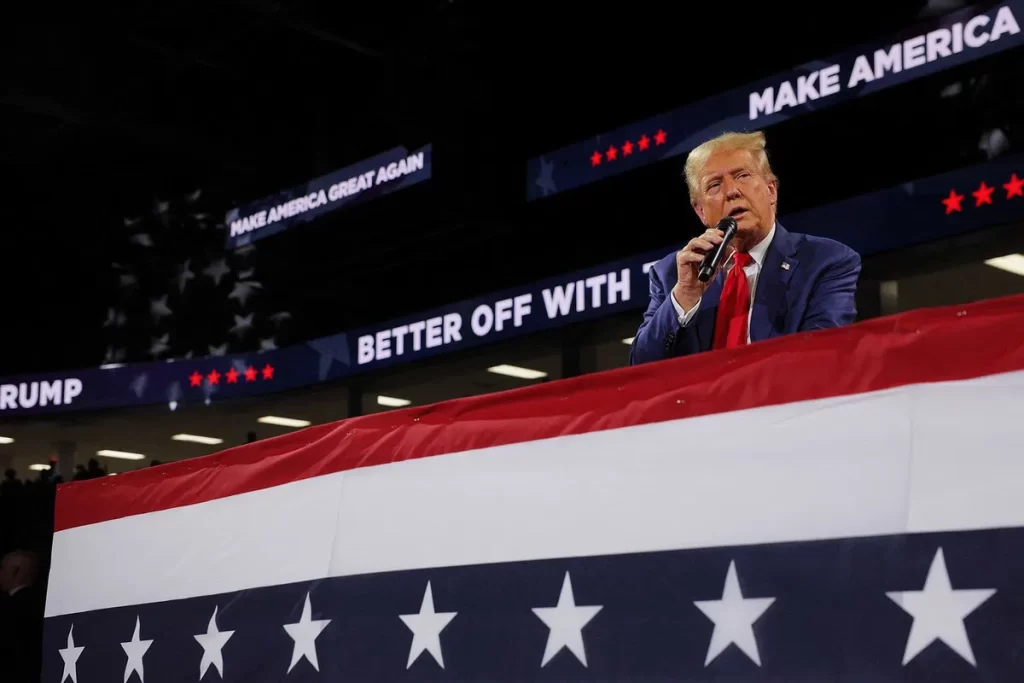Trump tailors his message to key state of Michigan as he returns to the campaign trail after apparent assassination attempt
3 min read

Former President Donald Trump addressed a crowd in Michigan on Tuesday night, emphasizing his economic plans and how they could revitalize the state’s automotive industry. This was his first campaign appearance following a recent assassination attempt, which he referenced as part of his broader narrative on the challenges he faces.
During the rally in Flint, Trump outlined a proposal to impose steep tariffs on vehicles imported from countries like Mexico and China, claiming these measures would stimulate the local economy. “I would impose a 200% tariff on cars imported from Mexico, making them unsellable,” he asserted, linking these tariffs to a resurgence in U.S. manufacturing.
In his remarks, Trump took aim at Shawn Fain, president of the United Auto Workers union, criticizing his support for President Joe Biden’s electric vehicle transition. He argued that this shift would lead to job losses, stating, “All those vehicles are going to be made in China and Mexico,” despite recent union contracts designed to ensure production in the U.S.
“We will bring so many auto plants back to America,” Trump proclaimed. “You will be as big, if not bigger, than you were 50 years ago.” He emphasized that if companies were unwilling to build plants in the U.S., they should not expect to sell their products here. Trump reiterated his stance on tariffs, calling them a “beautiful word” and pledging to match tariffs imposed by other countries.
His message was strategically aimed at Michigan, a state he won in 2016, known for its blue-collar workforce that historically leaned Democratic. While the assassination attempt was a recurring theme in his speech, he largely kept the focus on tariffs and their potential impact on the automotive sector.
Trump’s comments drew a quick response from Vice President Kamala Harris’s campaign, which characterized his proposed tariffs as a potential “inflation-driving national sales tax.” They noted that the burden of these tariffs would likely be passed on to consumers, increasing costs for everyday Americans.
The former president warned that if Harris were to win the upcoming election, it would lead to “zero car jobs, manufacturing jobs—everything will be gone.” He vowed, “We’re going to bring it all back,” indicating his intent to restore American manufacturing.
In addition to his economic discourse, Trump touched on various issues during the rally, from concerns about nuclear war to expressing admiration for Elon Musk. He also shared details of the assassination attempt, including his conversations with Harris and Biden following the incident.
As Trump made his way to the stage, he navigated a pathway lined with metal barricades, where supporters reached out to greet him. He often eschews close interaction at rallies, preferring to wave from an elevated platform.
While speaking to Arkansas Governor Sarah Huckabee Sanders, his former press secretary, Trump likened the political climate to dangerous sports, saying, “They think race-car driving is dangerous. No, this is a dangerous business, so we have to keep it safe.”
Reflecting on his discussions with Biden and Harris, Trump remarked on their politeness during their phone calls. He expressed a desire to remain cordial, even as he stressed the importance of winning the election. “I wish the call hadn’t happened, but they couldn’t have been nicer,” he said.
Harris later addressed the calls in a separate event, emphasizing that political violence has no place in democracy. She reiterated her commitment to healthy debates without resorting to violence, further commenting on the state of political discourse.
In his remarks, Trump praised the Secret Service for their actions during the assassination attempt, commending the agents for their quick response. “They did a hell of a job,” he said, while acknowledging ongoing concerns about resource limitations within the agency.
His comments come amid scrutiny of the Secret Service, particularly regarding their failure to prevent a shooting incident at a rally in Pennsylvania earlier this summer. Senators from both parties have expressed frustration with the Department of Homeland Security’s lack of transparency regarding these security lapses.
As the campaign trail continues, Trump’s focus on Michigan and his proposals for tariffs suggest he aims to reclaim the support of blue-collar voters, an essential demographic for his political strategy moving forward.